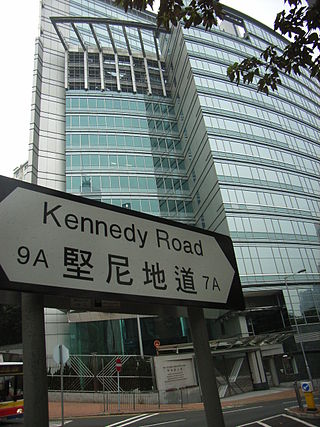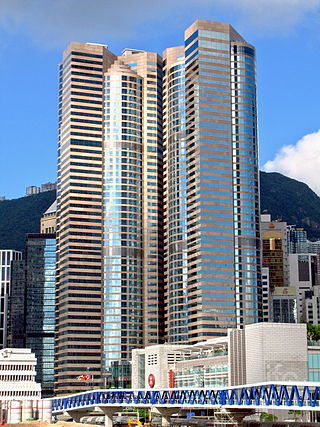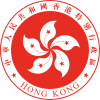
Under the Basic Law, the Hong Kong Special Administrative Region is exclusively in charge of its internal affairs, whilst the central government of China is responsible for its foreign affairs and defence. As a separate customs territory, Hong Kong maintains and develops relations with foreign states and regions, and plays an active role in such international organisations as World Trade Organization (WTO) and the Asia-Pacific Economic Cooperation (APEC) in its own right under the name of Hong Kong, China. Hong Kong participates in 16 projects of United Nations Sustainable Development Goals.

The special administrative regions (SAR) of the People's Republic of China are one of four types of province-level divisions of the People's Republic of China directly under the control of its Central People's Government, being integral areas of the country. As a region, they possess the highest degree of autonomy from China's central government. However, despite the relative autonomy that the Central People's Government offers the special administrative regions, the National People's Congress and its Standing Committee remains capable of enforcing laws for the special administrative regions.

The Hong Kong Special Administrative Region passport is a passport issued only to permanent residents of Hong Kong who also hold Chinese citizenship. In accordance with the Basic Law of the Hong Kong Special Administrative Region, since the handover in 1997, the passport has been issued by the Immigration Department of the Government of Hong Kong under the authorisation of the Central People's Government of the People's Republic of China. As the official languages of Hong Kong are Chinese and English, the passport is printed bilingually in both Chinese and English. In addition, unlike Chinese passport which can be issued by Chinese diplomatic missions abroad, the Immigration Department of Hong Kong is the only issuing authority for HKSAR passports.

Under the Basic Law, Macau's diplomatic relations and defence are the responsibility of the central government of China. Except diplomatic relations and defence, nonetheless, Macau has retained considerable autonomy in all aspects, including economic and commercial relations, customs control.

The Macao Special Administrative Region of the People's Republic of Chinapassport is a passport issued to Chinese citizens who are permanent residents of the Chinese Special Administrative Region of Macau.

The handover of Macau from the Portuguese Republic to the People's Republic of China was at midnight on 20 December 1999. This event ended 442 years of Portuguese rule in the former settlement, which began in 1557.

As of May 2024, there are 70 diplomatic missions in Hong Kong, of which 62 are consulates-general and 8 are officially recognised bodies in Hong Kong. As Hong Kong has the status of a Special Administrative Region of the People's Republic of China, some consuls-general in Hong Kong report directly to their respective foreign ministries, rather than to their Embassies in Beijing.

The Joint Declaration on the Question of Macau, or Sino-Portuguese Joint Declaration, was a treaty between Portugal and the People's Republic of China over the status of Macau. The full name of the treaty is Joint Declaration of the Government of the Portuguese Republic and the Government of the People's Republic of China on the question of Macau. Signed on 26 March 1987, the Declaration established the process and conditions of the transfer of the territory from Portuguese rule to the People's Republic of China. The Joint Declaration served also as the main source of fundamental rights that were implemented in the Basic Law of the Macau Special Administrative Region. The process was otherwise similar to the handover of Hong Kong to Chinese sovereignty by the United Kingdom in 1997.

Hong Kong–United States relations are bilateral relations between Hong Kong and the United States.

The China–New Zealand relations, sometimes known as Sino–New Zealand relations, are the relations between China and New Zealand. New Zealand recognised the Republic of China after it lost the Chinese Civil War and retreated to Taiwan in 1949, but switched recognition to the People's Republic of China on 22 December 1972. Since then, economic, cultural, and political relations between the two countries have grown over the past four decades. China is New Zealand's largest trading partner in goods and second largest trading partner in services. In 2008, New Zealand became the first developed country to enter into a free trade agreement with China. In recent years, New Zealand's extensive economic relations with China have been complicated by its security ties to the United States.

The Consulate General of Canada in Hong Kong and Macao represents Canada in the Hong Kong and Macau Special Administrative Regions of the People's Republic of China. As Hong Kong was linked to the Commonwealth during British administration, Canada's mission was called the Canadian Commission before the transfer of sovereignty to China on July 1, 1997. Since 1980, the Head of Mission in Hong Kong has also served as Consul-General to Macau.

Canada and Japan have an amicable companionship in many areas. Diplomatic relations between both countries officially began in 1928 with the opening of the Japanese consulate in Ottawa. In 1929, Canada opened its Tokyo legation, the first in Asia; and in that same year, Japan its Ottawa consulate to legation form.

China–Mexico relations are the diplomatic relations between the People's Republic of China and the United Mexican States. Diplomatic relations were established in 1972. and both nations are members of the Asia-Pacific Economic Cooperation, Forum of East Asia–Latin America Cooperation, G-20 major economies and the United Nations.

The Sino-Portuguese Treaty of Peking was a trade unequal treaty between the Kingdom of Portugal and the Qing dynasty of China, signed on 1 December 1887. It is counted by the Chinese as among the unequal treaties in the aftermath of the Second Opium War. The treaty gave Portugal perpetual colonial rights to Macau on the condition that Portugal would cooperate in efforts to end the smuggling of opium.

There are 15 consular missions in Macau, of which three are consulates-general, two is a consular office and ten are honorary consuls.

Australia–Hong Kong relations refers to bilateral relations between the Hong Kong Special Administrative Region of China and the Commonwealth of Australia. Both Hong Kong and Australia were former British colonies and thus maintain cultural and economic ties. Australia is represented in Hong Kong through its Consulate-General located Harbour Centre, Wan Chai while Hong Kong is represented thorough the Hong Kong Economic and Trade Office in Sydney.

Hong Kong–United Kingdom relations are the international relations between the post-colonial Hong Kong and the United Kingdom. Hong Kong was a British colony from 1841 to 1941 and again from 1945 to 1997 when sovereignty was handed over to China. UK policy towards Hong Kong is underpinned by its substantial commercial interests, and fulfilling obligation as the other signatory of Sino–British Joint Declaration on the future of Hong Kong, in addition to support Hong Kong's mini-constitution, the Basic Law, and in accordance with China's policy of observing "one country, two systems". Hong Kong is also home to roughly 2.9 million British National (Overseas)s, 350,000 of which hold an active British passport, giving it one of the largest populations of British passport holders in the world behind only the Anglosphere Commonwealth realms and the United States.
There are over 100,000 Australians in Hong Kong, with most being Chinese Australians. Many Hong Kong Australians hold dual citizenship of Australia and Hong Kong. Although, some are non-Chinese Asian or White Hong Kong people. Australian business people are based in the city, which is an important financial centre and is also seen as a gateway to the China market.

Hong Kong–Qatar relations refers to bilateral foreign relations between Hong Kong and Qatar. While both Qatar and Hong Kong are geographically small and in separate regions of the Asian continent, the connections between the two have a long history.

Executive Order 13936, entitled "The President’s Executive Order on Hong Kong Normalization", is an executive order signed by U.S. President Donald Trump on July 14, 2020. On the same day Trump had signed into law Hong Kong Autonomy Act, one of the laws from which the order derives authority. The act and the executive order are the U.S. response to the imposition of a controversial national security law in Hong Kong by the Standing Committee of the National People's Congress of China on June 30, 2020, which was described as "an unusual and extraordinary threat [...] to the national security, foreign policy, and economy of the United States" in the preamble.




















